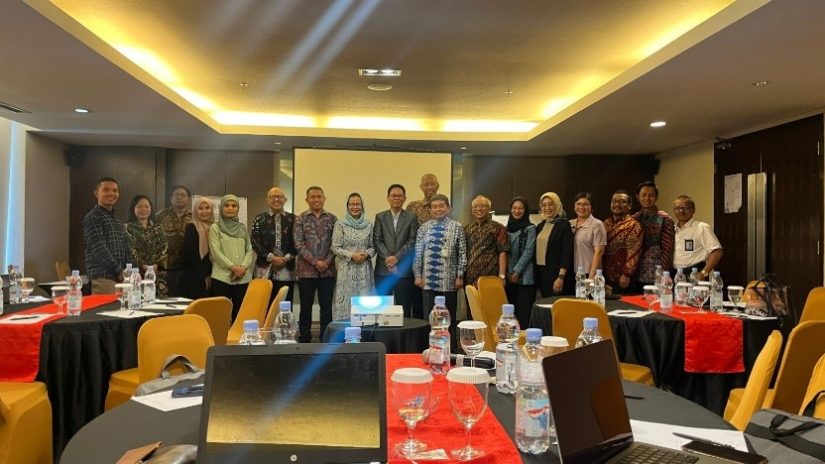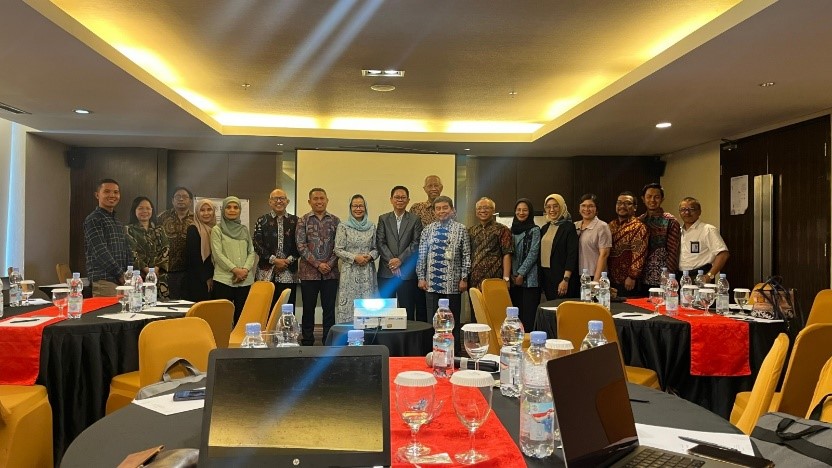

To anticipate future educational developments and the existence of Minister of Research, Technology and Higher Education Regulation No. 53 of 2023 concerning Quality Assurance in Higher Education, the Master of Higher Education Management Study Program (MMPT) Gadjah Mada University Postgraduate School carries out a series of activities to strengthen the curriculum. One of the activities carried out was a curriculum development workshop which took place on December 17 Yogyakarta at the Artotel Bianti Hotel Yogyakarta.
The curriculum development workshop is focused on getting input from graduate users, alumni and lecturers who teach courses in the MMPT Study Program. The things discussed in this workshop were regarding Permenristekdikti No. 53 of 2023 article 9 which states that in applied master’s/master’s programs, the study load is in the range of 54-72 credits which is designed with a curriculum duration of 3-4 semesters.
As is known, the MMPT Study Program was accredited through LAM-EMBA (Economics, Management, Business, Accounting) in October 2023, receiving the title “Very Good”. The MMPT study program is the first study program at UGM to be accredited by LAM-EMBA.
Currently, the MMPT Study Program is collaborating with National ChengChi University (Taiwan) and has received a grant for preparing an international accreditation proposal from SPMRU UGM with the target of international accreditation from ACQUIN (Germany).
Apart from that, the MMPT Study Program is also developing a network with Griffith University (Australia) through the UGM International Joint Research Academy (IJRA) scheme, and collaboration with the University of Warwick – ISPF British Council and DRPTM Kemenristekdikti.
The workshop was opened by the Dean of the Postgraduate School, Gadjah Mada University, Prof. Ir. Siti Malkhamah, M. Sc, Ph. In the future, the Postgraduate School will also strengthen risk management for all teaching and learning activities and supporting activities.
Prof. Suadi, S.Pi, M.Agr.Sc, PhD, Director of Human Resources, Gadjah Mada University, gave a briefing speech at this workshop, especially focused on human resource development at UGM, which in essence will develop core competencies, leadership competencies and technical competencies for all lecturers and educational workforce in the future. To achieve core competencies, for example, lecturers and staff must take part in competency development for a minimum of 20 JP per year. HR management at UGM can be planned, implemented and evaluated independently, but what cannot be managed is the external environment that influences UGM’s internal policies such as changes in ministerial regulations, etc.
The workshop event was fully guided by the Head of the MMPT Study Program, Dr.rer.nat. Wahyu Supartono, also invited graduate users who could provide input for competency development and technical aspects that graduates need to master. Dr. Edhy Sutanta, Chancellor of AKPRIND University, who was pleased to attend and provide input about how MMPT graduates can be designed to become Middle-Top Managers who can manage PTs well in academics, human resource development, finance, asset management and most importantly can carry out the tri dharma of higher education and generate income. -generate for the development of PT.
Furthermore, the Academic Administration Bureau of Duta Wacana Christian University (UKDW), Indah Sutanti Pangabean, M.Sc stated that the results of teaching and learning activities in the MMPT Study Program provide added value because they can be applied in PT academic activities. The ability to manage, lead and make decisions plays a very important role in PT management. Then the Yogyakarta State University Cyber Security Bureau, Rusnandar, M.Sc, emphasized that there is a need for risk management in HEIs (especially in protecting personal data), improving service management and strengthening digital transformation in the future.
The various responses from lecturers and alumni were numerous and useful for future development of the MMPT study program curriculum, so that graduates will have competencies that can adapt quickly to their work environment. What is widely highlighted and taken into consideration for increasing competence is strengthening leadership in higher education, strengthening statistics and holistic data analysis, strengthening the research ecosystem, entrepreneurial spirit, strengthening design thinking and sustainability issues.
Wahyu Supartono
Editor: Siti Muyasaroh
